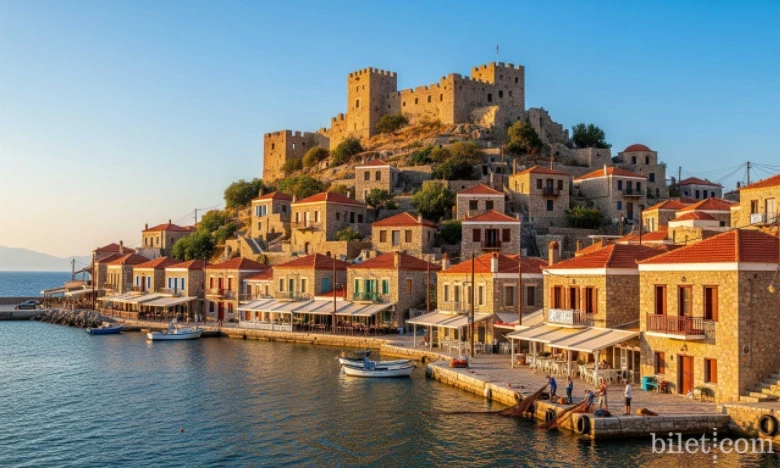Located in the northeast of the Aegean Sea, overlooking the coast of Ayvalık in Turkey, the magnificent Lesbos island, the third largest island in Greece , promises its visitors much more than a typical Greek island experience. It is not only a holiday destination with beautiful beaches; it is also an authentic and deep cultural center, adorned with the silvery leaves of millions of olive trees, where the lyrical lines of Sappho, one of the greatest poets of antiquity, echo, and is considered the homeland of ouzo. With its architecture, gastronomy, artistic heritage and untouched nature, Lesbos is a haven for those who want to discover an island with a soul. Let’s take a closer look at the rich past and the unique identity of this fertile land today.
The Island Behind the Names: Lesbos and Mytilene
The island has two names, each telling a different story:
Lesbos (Lesvos - Λέσβος): The name of the island used internationally and in Greek. According to mythology, the name of the island comes from Lesbos , a Thessalian hero . The hero Lesbos came to the island and married Mythimna, the daughter of Makaras, the first king of the island, and gave his name to the island.
Midilli (Mytilene - Μυτιλήνη): The Turkish name of the island and also the name of its largest city and capital. This name is also based on mythology; Mytilene is the other daughter of King Makaras. Over time, the name of the capital, especially during the Ottoman period, came to be used for the entire island and the word "Mytilene" turned into "Midilli" in Turkish.
The Birthplace of Lyricism: Sappho and the Ancient Heritage
Lesbos' greatest fame in world cultural history is undoubtedly that it is home to Sappho , one of the most important lyric poets of antiquity.
Sappho's Legacy: Born in the island city of Eressos in the late 7th century BC, Sappho is known for her personal and passionate poems about love, desire, beauty and nature. Her lines, especially those about love and friendship between women, have made her immortal. Today, the word "lesbian" originates from Sappho's home island of Lesbos. Her poems continue to inspire the island's artistic and bohemian spirit even thousands of years later.
The Island of Thinkers and Artists: Lesbos gave birth in ancient times not only to Sappho, but also to her contemporary, the poet Alkaios , the philosopher Theophrastus , the successor of Aristotle , and more recently to the poet Odysseas Elytis , who won the Nobel Prize in Literature. Theophilos, an important figure in folk painting, was also a Lesbos child. This rich heritage has permeated every corner of the island.
Layers of History: From Castles to Ouzo Factories
Lesbos has attracted the attention of many civilizations throughout history with its strategic location and fertility.
Antiquity and Byzantium: The island, which was an important Aiolian cultural center in ancient times, became part of the Roman and then Byzantine Empires. During these periods, the commercial and religious importance of the island increased.
Genoese Domination: In the 14th century, the island came under the rule of the Genoese Gattilusio family. The castles that still stand magnificently today in Lesbos and Molyvos are the most important legacies of this period.
Ottoman Period: Conquered by Fatih Sultan Mehmet in 1462, the island remained under Ottoman rule for approximately 450 years. During this long period, mosques, baths and fountains were built on the island, and Turkish and Greek communities lived together. The island's olive oil, soap and ouzo production also developed during this period.
Modern Greece: Lesbos, which joined Greece in 1912 following the Balkan Wars, maintained its cultural and economic importance in the 20th century.
Spirit of the Island: Ouzo, Sardines and Olive Oil
To understand the identity of Lesbos, you have to taste its flavors. The island is one of the richest gastronomic centers of Greece.
Plomari, the Capital of Ouzo: Lesbos is considered the homeland of ouzo, the national drink of Greece. The town of Plomari in particular is home to world-famous ouzo brands (such as Barbayanni and Isidoros Arvanitis). You can witness the making of this anise-scented drink by visiting the town's ouzo museums and distilleries.
Kalloni Sardine: The large and shallow Gulf of Kalloni in the middle of the island is famous for its rich marine life. The Kalloni sardine, known as "papalina" and caught especially in the summer months, is the most famous delicacy of the island.
Liquid Gold: Olive Oil: More than 11 million olive trees cover the island, making Lesbos one of the most important olive oil production centers in Greece. The island's prized olive oil is the key ingredient that gives its dishes their unique flavor.
Lesbos Beauties to Discover: Villages, Castles and Natural Wonders
Each region of Lesbos offers a different character and beauties to discover:
Lesbos (Mytilene) City: The lively capital of the island, with its magnificent Agios Therapon Church, imposing castle, museums (Archaeology, Byzantine, Theophilos) and lively port, is worth a full day.
Molyvos (Mythimna): Located in the north of the island, Molyvos is undoubtedly one of the most beautiful and best-preserved villages in Greece. With its stone houses built on a hill, cobblestone streets covered with ivy, small fishing harbour and Genoese castle on top, it resembles a medieval fairy tale.
Eressos and Skala Eressou: The ruins of ancient Eressos, Sappho's birthplace, and its seaside settlement of Skala Eressou are known for their long sandy beach, relaxed atmosphere and bohemian spirit.
Petrified Forest: Located in the west of the island, near Sigri, this UNESCO World Geopark is a unique natural wonder composed of tree trunks that were petrified by volcanic ash 20 million years ago. The Natural History Museum in Sigri provides great information about this geological formation.
Agiasos: A lush mountain village, Agiasos is one of the most authentic corners of the island with its traditional architecture, ceramic and wood carving workshops and church dedicated to the Virgin Mary.
Thermal Waters and Beaches: The healing hot springs at Eftalou and Gera are ideal for relaxation, while beaches such as Vatera, Agios Isidoros, Petra and Anaxos offer countless options to enjoy the Aegean.
Lesbos is the perfect island for travelers looking for a deep and authentic experience, beyond the crowds and clichés, full of art, history, nature and flavor. It promises to slow down, explore and touch the true spirit of the Aegean.
Add Lesbos to the top of your travel list to walk in the lands where Sappho's verses were born, sip ouzo under the shade of a century-old olive tree, and get lost in the countless beauties that this generous island of the Aegean has to offer.







